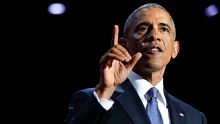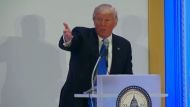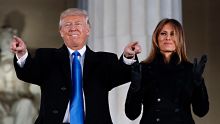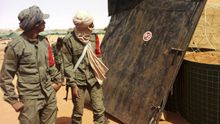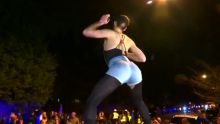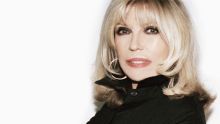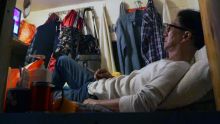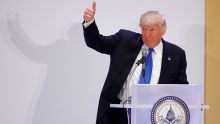More World News Videos
Trump boasts of "highest IQ cabinet ever assembled"
President-elect Donald Trump attends a luncheon with administration members and Republican leaders at Trump International Hotel in Washington, and says "we're doing very well together."
The two-storey, 23-room house sits grandly on Midland Parkland in the Jamaica Estates neighbourhood in Queens, its portico upheld by six white columns, as if a plantation manse from the South had been transplanted to suburbia.
It was here, in a mansion built by his father, with a chauffeur-driven limousine in the driveway, that Donald Trump spent most of his childhood. And it was here, in this house that symbolised how the Trumps were bigger and brasher than all around them, that Donald first revealed his rebellious nature.
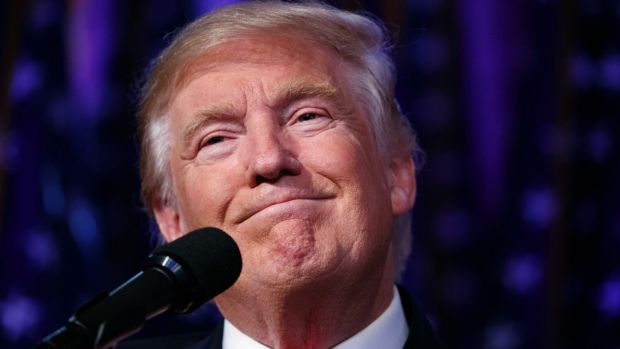
He punched his music teacher, disobeyed his parents by sneaking into Manhattan and, according to his close friend at the time, bought a switchblade knife. Eventually, his parents sent him away, enrolling him for five teenage years in New York Military Academy, which tried, and often failed, to calm the most hyperkinetic of all the Trumps. Donald, the family learnt, could not be easily contained.
Now, as Trump prepares to move into a far grander, many-columned home, he is once again unlikely to be contained. That, it seems, is what the voters wanted. Trump's arrival in Washington has excited a cross-section of the country who see in him not an elitist, but a populist who can explode the way business is done in the nation's capital.
The fact that Trump comes from such a privileged background, and that he became fabulously wealthy by catering to some of the world's richest people, did not put off the millions of working-class people who supported him. To the contrary, they see him as their champion, even as he stacks his cabinet with fellow billionaires.
Trump comes to this moment as a more complex man than is widely realised. He is in some ways still the boy from Queens, who grew up in a bubble amid a melting pot, wanting to be, as he wrote in 2016, "the toughest kid in the neighbourhood ... mouthing off to everybody while backing down to no one".
He moved across the river to cater to the Manhattan glitterati but never quite felt accepted; they were put off by his crude language and boastful manner. He is also a survivor who filed six corporate bankruptcies even as he lived in his three-storey gilded aerie at the top of a tower he named after himself.
For much of his 70 years, Trump has been on a roller-coaster ride of rebellion and revolution and upending it all, of risking everything, leaving wreckage in his path when necessary, and, above all, finding a way to survive. To win. It's all about winning, he said often, and he did win the presidency, much to the surprise of myriad pundits and pollsters, as well as his vanquished rival, Hillary Clinton.

For all the unpredictable nature of his actions, he has remained stubbornly consistent about how he believes the world views America. He fumed in 1987 about the United States being laughed at by the rest of the world. He said the same thing in 2016. Yet his politics changed endlessly: Democrat, Republican, Independent, Reform Party, Republican again. So did his positions; first he favoured abortion rights, citing his "pro-choice instincts", then he opposed them. He favoured universal health-care coverage before he called for repealing Obamacare. He called for higher taxes on the super wealthy before suggesting tax cuts. He had no core, his opponents said.
What is now clear is that lack of ideology is his ideology: It's the ideology of winning. If he is to be successful, that pragmatic side, which has served him so well when he needed it, could be his guiding principle - unless he finds it cannot coexist with his love of rebellion.
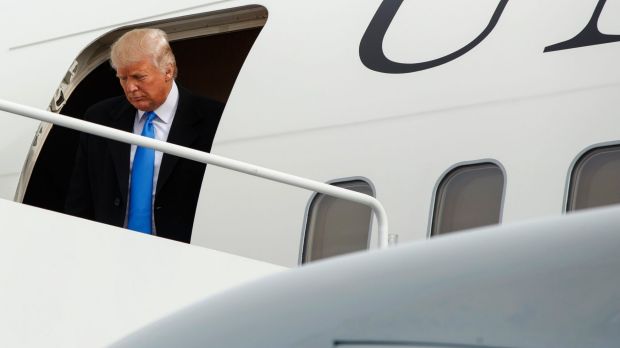
Trump's life, beginning with the street in Queens where grew up, provides a road map to his outlook and vision and failings, showing how he dealt with one crisis after another, touchstones that may foreshadow how he will handle the presidency.
❑ ❑ ❑

Descending the 17 steps of the mansion in Jamaica Estates, walking down a tree-lined street and then turning onto Hillside Avenue, Donald Trump arrived at the Jamaica-179th Street subway station, where he often boarded the F train to Manhattan. His parents were unaware that their pre-teen son was wandering around the city, which the family considered too dangerous. Trump was enthralled with the teeming borough on the opposite side of the East River, and so began his dreams of always doing something bigger.
These early journeys eventually led him to envision building skyscrapers in midtown Manhattan. His father, Fred Trump, said the idea was "crazy", Donald later wrote, and initially tried to keep him within the outer boroughs. He named Donald the president of Trump Management, which oversaw a real estate empire in Brooklyn, Queens and Staten Island from a modest office on Avenue Z near Coney Island.

The family's grand achievement was Trump Village, which would have looked at home in the former Soviet Union, a dreary collection of seven 23-storey buildings, 2300 units built as cheaply as possible. The working-class residents were grateful to Fred Trump for the affordable housing, but Donald later wrote that it "was not a world I found very attractive".
He continued to dream of building in Manhattan and catering to some of the world's wealthiest people. His father eventually assented to the idea. Fred once gave a speech that Donald attended in which he laid out the Trump philosophy.
"Nine out of 10 people don't like what they do," Fred said. "And in not liking what they do, they lose enthusiasm, they go from job to job, and ultimately become a nothing."
Donald aimed to become something.
Trump's will was soon tested when the Justice Department sued Donald and his father, alleging that Trump Management officials steered blacks away from buildings that were mostly occupied by whites.
It was left to Donald to decide whether to settle the case, and he sought the advice of Roy Cohn, the tenacious former counsel to Senator Joseph McCarthy, who urged him to fight the government, hitting back 100 times harder. Trump eventually settled the case two years later - the first of many times he would say he would never settle and then did - but these events proved to be among the most formative of his life. They define him to this day.
Trump learnt to fight, to threaten, to countersue. He harboured an animus to the federal government that never subsided, feeling he was treated unfairly, which could affect his view of lawsuits that his administration might be asked to bring.
He remains angry that the first real attention that he received in the media - a front-page story about the case in The New York Times headlined "Major Landlord Accused of Antiblack Bias in City" - in effect suggested that he was racist.
Trump, anxious to move on from the outer boroughs and the racial-bias case, determined he would become a major builder in Manhattan, and he succeeded. Taking advantage of a variety of tax incentives, he built a Hyatt Hotel and Trump Tower, playing a major role in revitalising parts of Manhattan. The projects' success boosted Trump's ego and power. He had gone against his father's initial advice to avoid Manhattan, and it had paid off. Now he set his sights on even bigger projects.
❑ ❑ ❑
Trump soon travelled by seaplane to Atlantic City and decided that he wanted to be the biggest casino operator in the Eastern United States. At first, he said he would follow his father's second piece of advice: never go deeply into debt. He testified at a New Jersey Casino Control Commission hearing that he would never use "junk bonds" that paid 14 per cent interest because they were too risky. But his ambition to be the biggest operator was so intense that he soon relied on the junk bonds he had disdained, and he went deeply into personal debt.
He told the story of walking down Fifth Avenue and seeing an impoverished blind man. Trump told his companion that the man hawking pencils was $US900 million richer than he was - because Trump's negative worth was precisely that much.
He pleaded with Japanese bankers, hid his fleet of helicopters from those who wanted to repossess them, and persuaded a bank to insure a yacht that he couldn't afford.
He had believed that he could succeed by attracting big-spending gamblers, but his associates gave him a piece of advice that would later resonate in his presidential campaign: It's fine to have the support of the wealthy big spenders, but the path to profitability would rely on attracting people of more modest means who boarded buses to his casinos to inject a little excitement into their lives; they just wanted to taste the Trump experience and feel wealthy.
On October 10, 1989, just as Trump's financial problems were coming to a head, at Trump Tower he met three executives who ran his casinos. The trio boarded a helicopter to return to Atlantic City. As the chopper headed over the Garden State Parkway, a rotor broke, and the aircraft crashed, killing all aboard. A devastated Trump informed the families. As his financial problems mounted, he realised that he had, as he put it, taken his "eye off the ball", in part because he was having an affair with Marla Maples while he was married to Ivana Trump, the first of his three wives.
"For the first time since I had known him, I heard fear and uncertainty in his voice," said Jack O'Donnell, who ran the Trump Plaza Hotel & Casino at the time and later wrote a book about the experience.
As Trump tried to regain control, he lashed out at other executives, blamed those who died in the helicopter crash for his problems, and fired employees. It was, to this point, his greatest test. He managed to open his third and grandest casino, the Taj Mahal, but it cannibalised business from his other two at the very time Atlantic City was experiencing an economic slowdown. Everything Trump built was at risk. Yet Trump had piled one risk on top of another.
He bought New York's Plaza Hotel for $US407 million, admitting that "I can never justify the price I paid" but explaining that he had to have the trophy property, which symbolised wealth, class and elegance.
He paid $US365 million for an airline that became the Trump Shuttle, even though he knew nothing about the business, which eventually floundered.
He put all three casinos into corporate bankruptcy, as well as the Plaza Hotel and two other businesses. He created a public company, paid himself millions of dollars, and saw the stock price fall from $US35 a share to 17 cents. Through it all, investors howled, bondholders cried foul, and contractors - many of them small-businessmen - said they were stiffed.
Yet Trump survived.
He renegotiated countless contracts, persuaded the banks to let him keep a majority stake in the properties, and avoided personal bankruptcy. He explained it this way in an interview with The Washington Post: "I wasn't representing the country. I wasn't representing the banks ... I was representing Donald Trump. So for myself, they were all good deals."
This, said the author of Trump: The Art of the Deal, was an even more magnificent chapter, and so he wrote The Art of the Comeback (1997). He had learnt a lesson. His father had been right; it was a mistake to go so deeply into debt. In the future, he decided, he would mostly let others take the risk. He would sell his name to developers who would put it on their buildings; he would get a licensing fee with no downside. Even if the property failed, he won.
Gradually, as Trump's name started appearing on more properties around the world, a television producer named Mark Burnett, who had created a show called Survivor, came calling.
Trump was dismissive; reality television "was for the bottom-feeders of society". But Burnett was persuasive. Trump would play himself in a show called The Apprentice, which would relentlessly promote Trump as the epitome of success. For millions of Americans, this became their image of Trump: in the boardroom, in control, firing people who didn't measure up to his standard. Trump lived in grand style, flew in a Trump-emblazoned jet or helicopter, and travelled from Trump Tower on Fifth Avenue to Mar-a-Lago in Palm Beach, Florida.
Most viewers didn't realise it, but the show helped transform a man who had nearly suffered catastrophic financial failure into a success. Trump has said he earned $US214 million during 14 seasons of the NBC broadcast, and he made more from related licensing deals for products including ties and cologne. His name became a valuable brand. When Trump showed up at a minor event to promote his clothing line, he was asked why he was there. His answer defined his philosophy: "Because I want to win, and I'll do whatever it takes to win."
Having agreed to host The Apprentice, he set out to appeal to the "bottom-feeders" he had derided, and he found that he excelled at his new craft. Showmanship came naturally. His father had promoted housing on Coney Island with an array of stunts, and his mother, an émigré from Scotland, had often told Donald of her love of royal pageantry. Trump had combined these two parental traits and created a political persona unlike any other.
Without The Apprentice, there almost certainly would have been no presidential candidacy and no President Trump. The self-described multibillionaire took pride in being able to appeal to the average working person.
One of his most famous comments - that "I could stand in the middle of Fifth Avenue and shoot somebody, and I wouldn't lose voters" - underscored his belief that he could say or do anything without harming his brand. His family called him a "working-class billionaire"; he liked nothing more than a Big Mac and fries and a binge on television shows. He said he had never read a book about a president, and he didn't like long briefings or lengthy papers. Summaries would suffice.
Trump's incuriosity about much of the world inevitably led to derision that he did not have the intellectual capacity nor temperament to be president. But Trump had a different kind of genius. He was a showman who understood the power of television, where most people got their information. (When social media started to play an outsize role, he seized on that, as well.)
He threw himself into the world of professional wrestling, appearing in the ring before 80,000 people in Detroit in 2007, and celebrated the crassness of it all. Just like a pro, he pretended to body-slam an opponent, soaking in the crowd's roar. In retrospect, the WrestleMania appearances were a warm-up for the rambunctious rallies that Trump would hold during the 2016 campaign; he developed an uncanny sense about how to read the mood in an arena and play to a pumped-up crowd.
Indeed, anyone who was paying attention to Trump's speeches or read his books (which were typically written by ghostwriters or co-authors) could have seen the antecedents of his presidential campaign strategy. He said he agreed with the idea that paranoia was the key to success. "Now that sounds terrible," Trump said in a speech earlier in his career. "But you have to realise that people - sadly, sadly - are very vicious. You think we're so different from the lions in the jungle?"
The Trump style - boasts and bombast, attacks and taunts - were hardly new devices. He has been using them for decades.
To read Trump's books is to find a man of contradiction. In Surviving at the Top (1990), Trump wrote that one of his rules is "don't think you're so smart that you can go it alone". But in Think Like a Billionaire (2004), Trump wrote that one his of rules was to "think of yourself as a one-man army. You're not only the commander in chief, you're the soldier as well. You must plan and execute your plan alone."
Trump's other rules in this latter book included not taking a vacation, having a short attention span, and not relying on technology. "Friends are good, but family is better," Trump wrote, foreshadowing his heavy reliance during the campaign on his children, particularly his daughter Ivanka and her husband, Jared Kushner.
Some of the most revealing words written by Trump came in The Art of the Comeback, which during the presidential campaign received notice because he had included a picture of himself with Hillary Clinton, writing that "the First Lady is a wonderful woman who has handled pressure incredibly well". Much of the book is about how Trump rebounded from his financial nadir. It is a story that he rarely told on the trail, where he depicted himself mostly as an unerring success. But as he told it in his book, "the worst of times can turn to your advantage - my life is a study of that. I learnt so much during the tough years ... I learnt about handling pressure. I was able to home in, buckle down, get back to basics, and make things work. I worked much harder, I focused and I got myself out of a box."
❑ ❑ ❑
Trump teased his candidacy for decades. He first raised the possibility in 1987, travelling to the first-primary state of New Hampshire, but it turned out to be a promotional ploy for his first book, The Art of the Deal. In 1988, Trump attended the Republican National Convention to watch George H.W. Bush receive the nomination. Appearing on a CNN show at the convention, Trump was asked by host Larry King about his wealth.
He responded by saying he was a man beloved by average people.
"You know, wealthy people don't like me because I'm competing against them all the time and I like to win," Trump said. "The fact is, I go down the streets of New York and the people that really like me are the taxi drivers and the workers."
"Then why are you a Republican?" King asked.
"I have no idea," Trump responded.
All he could say was that he believed in "certain principles of the Republican Party."
❑ ❑ ❑
After Trump descended the elevator in his eponymous tower on Fifth Avenue to declare his presidential candidacy in June 2015, his off-the-cuff comment that many illegal Mexican immigrants were criminals and rapists led many pundits to dismiss his chances. He stood in the low single digits in the polls.
Yet the polls provided the wrong numbers to study. Trump himself had correctly said in 2000 - when he briefly considered running for the presidency - that it was inevitable that an outsider would be elected president. Economic stagnation had only worsened since he made that prediction. The numbers that mattered most were these: the 117 million Americans in the bottom 50 per cent of the nation's economy had seen practically no real increase in their income since 1980, while the top 1 per cent had seen their net worth skyrocket. The status quo, which Hillary Clinton represented, was not acceptable to many. The approval ratings of Congress, and of Washington in general, were at historic lows.
Trump, who had spent much of his career selling high-end real estate to some of the world's wealthiest people, may have hardly seemed like the ideal carrier for the message of economic populism. There was little in Trump's career that indicated he was devoted to the concerns of the working class. But here is where the boy from Queens had an advantage that few seemed to realise at the time.
The essence of Trump's character could first be seen on the baseball field of his youth. Trump idolised Yogi Berra, the scrappy Yankees catcher, and played the same position, constantly chattering behind the plate, chiding the batter, seeking to rattle the opponent, not unlike his technique on Twitter today. Trump took out his aggression on the field, running hellbent around the bases, crashing into players who stood in his way, leaving the field with the dirtiest uniform. He had the power to hit home runs, but when he struck out, he sometimes slammed the bat against a concrete walk so hard that it splintered. He was often injured. But he loved playing catcher, he told his friends, because it was the roughest position the field.
"He learnt how to be very competitive," said Trump's childhood friend, Peter Brant, who played baseball with him in a Queens Little League. "It's pretty obvious how he conducted himself in this election is very similar to the way he was on the field; he basically wanted to win."
Brant, who also travelled by subway with Trump on sojourns into Manhattan, said Trump's upbringing in Queens, in a neighbourhood that was racially and economically mixed, goes far in explaining the President-elect. Brant recalled going to games at Ebbets Field in Brooklyn, where Trump picked seats with a clear view of the catcher, and sitting with blue-collar fans. They went to Fred Trump's construction sites and marvelled at the artistry of bricklayers. Given Trump's background, Brant said, it is not surprising that he found a way to relate to average folks.
"Donald can be a regular Joe," Brant said. "He grew up in Queens. You have to understand it's not like growing up in the suburbs of Washington, DC. This was Queens."
Although his Queens accent is mostly gone, Trump retains the demeanour that Brant saw long ago. It is a straight line from Trump's days taunting opponents from the catcher's position to the outrageous appearances on WrestleMania and then the belittling of adversaries on the campaign trail. Trump learnt through his experience with professional wrestling and The Apprentice, as well as his many appearances on late-night television shows and shock-jock radio programs, that he had a way - sometimes a crude way - of connecting with average people. He sounded equally at ease talking on Howard Stern's radio show about a woman's breasts as he was on CNBC discussing the future of interest rates. Before running for president, his most recent involvement in politics was to suggest, falsely, that President Barack Obama was not a US citizen, a claim it took years for him to abandon.
During his campaign, Trump boasted that he was uniquely prepared for the presidency. He said he knew more than the generals about the Islamic State, that he "alone" could fix the nation's problems. After winning the election, he said that he didn't need daily intelligence briefings because he was "smart" and they were often repetitive. His choices for a variety of cabinet positions were often provocative. He picked Andrew Puzder, an opponent of the minimum wage, to be labour secretary; Betsy DeVos, an advocate of private school vouchers, to be education secretary; and Scott Pruitt, who has said the science on climate change is "far from settled", to be the Environmental Protection Agency administrator.
For all his business experience, nothing in Trump's career is comparable to the demands of the presidency. Upon assuming the office, he will control a massive military and be responsible for deciding whether to launch nuclear weapons, a choice that he might have to make in minutes.
Trump will hold a unique place in the pantheon of presidents. He is the only businessman to become president who has not previously worked in some kind of public service, such as the military or the cabinet, presidential historian Douglas Brinkley said. "We've never had anybody who is just a business person making money for himself and has zero public office" experience, he said.
Will he be "presidential", as he has promised, or will he revert to campaign mode, relying on insult and bombast and Twitter? He made many promises that will be hard to keep: rebuild America's infrastructure; replace Obamacare with something "great" at a fraction of the cost; return coal and steel jobs; rebuild manufacturing; unite a deeply divided country.
Part of Trump's challenge will be coming to terms with his contradictions. He ran against the establishment, of which he is a member as a billionaire. He ran against the media, which he played expertly to promote himself. ("If you say outrageous things and fight back, they love you," Trump wrote in his 2016 book, Crippled America, about his media strategy.)
Trump ran against Washington, which he must now lead. He railed against the investment banking firm of Goldman Sachs, which he said had "total control" over Hillary Clinton. Then he appointed current or former Goldman Sachs officials to be treasury secretary, director of the White House National Economic Council and chief strategist.
Trump ran against not just the Democratic Party but also his fellow Republicans. He blasted Speaker of the House Paul Ryan, who had said Trump's words about the heritage of the judge in a case regarding Trump University were "the textbook definition of a racist comment"; now the two must work together. If Trump carries grudges into the White House, as he often did in business, he will have unprecedented power to launch vendettas. Already, he has used Twitter to warn critics that he won't hesitate to hit them back harder, just as Cohn taught him decades ago. Trump once explained his strategy by quoting what he called the "philosophy" of his long-time friend, boxer Mike Tyson: "Everybody has a plan until they get punched in the mouth."
Trump arrives in Washington with a Republican-controlled House and Senate, which should give him a clear path to pass many of his initiatives. But many Republicans remain sceptical about him, and Democrats in the Senate can try to stop him with filibusters. The public divisions aren't likely to go away. Trump won the electoral vote, but he would have lost it with a switch of just 107,000 votes in three states, and he lost the popular vote by 2.8 million.
So, how will Trump govern, this man who says one thing, then changes his mind, then attacks, then strives to please? Who tweets and preens and gloats. Who has no record of governance, who has had as much failure as success. He was elected on a wave of angst and anger, embodying an idea expressed by countless supporters: blow up the way Washington works (or doesn't work). Not just disruption but explosion.
Trump is well on his way to engineering that explosion, and the impact could reshape the country. Much will depend on how he sells his plans, and whether the economy continues to improve. An unforeseen crisis could emerge. George W. Bush, for example, had to deal with the September 11, 2001, attacks and the Great Recession. Such crises seize a president's attention, undermine his plans, reroute his vision. Trump's leadership skills doubtless will be tested in ways he has not yet imagined.
The prologue of the campaign is past. The tales of Trump's Queens childhood, as well as his bankruptcies, divorces, vulgar comments, casinos and reality show, are now the back story of his life, early chapters that shaped his road to the White House.
In the great sweep of history, it is only now, as Trump ascends to the presidency, that his story truly begins.
Michael Kranish is the co-author, with Marc Fisher, of The Washington Post biography Trump Revealed. He is an investigative political reporter on the national staff. The Washington Post's Michael E. Miller contributed to this report.
The Washington Post
